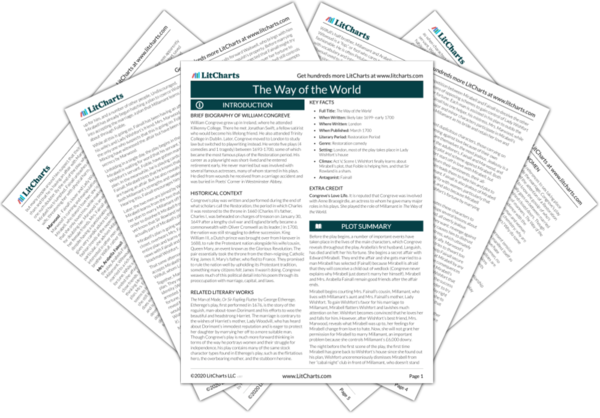The Way of the World is notable for its positive portrayal of independent, intelligent women. Several female characters are impressively independent and contribute their own helpful ideas to the schemes created by Mirabell and Fainall. The servant Foible is noted for her sharp wit and quick mind, which proves useful when she has to deceive Lady Wishfort. Mrs. Fainall is eager to destroy the plans of her adulterous husband even before she finds out he is untrue. Mrs. Marwood demands better treatment from a jealous Fainall and also coerces him to spend his money on her.
Millamant, though, is perhaps the most independent of all the women. Currently the belle of the town and a much sought after bride, she is clearly not the type to rush into marriage because she feels that she needs a man’s support. In the famous “proviso scene” between Mirabell and Millamant, Millamant outlines the terms of her marriage to Mirabell and resolves to retain her independence after marriage. This scene is an important departure from the conventions of the marriage plot—the fundamental plot of any comedy that ends with the engagement or marriage of the hero and heroine—found in other works of this period, expressing thoroughly modern ideas far advanced for Congreve’s time.
Yet despite these shows of independence, the women of the play are not entirely free from the constraints of a male-dominated society and are not as independent as they initially may seem. Mrs. Fainall requires the help of Mirabell, her former lover, to save her fortune. Millamant’s inheritance depends on whom she marries. Lady Wishfort is almost a victim of Fainall’s plan to blackmail her, a plan based on shaming his wife by exposing her affair with Mirabell. Furthermore, the terms Fainall demands to keep quiet about Lady Wishfort’s scandalous involvement with the disguised Waitwell would have curbed her power as matriarch, as well as cut down her finances.
Female (In)dependence ThemeTracker

Female (In)dependence Quotes in The Way of the World
…if we will be happy, we must find the means in ourselves, and among ourselves.
Men are ever in extremes; either doting or averse. While they are lovers, if they have fire and sense, their jealousies are insupportable: and when they cease to love…they loathe, they look upon us with horror and distaste, they meet us like the ghosts of what we were, and as from such, fly from us.
One’s cruelty is one’s power, and when one parts with one’s cruelty one parts with one’s power, and when one has parted with that, I fancy one’s old and ugly.
…for we shall be sick of one another. I shan’t endure to be reprimanded nor instructed; ’tis so dull to act always by advice, and so tedious to be told of one’s faults, I can’t bear it. Well, I won’t have you, Mirabell—I’m resolved…
Poison him? Poisoning’s too good for him. Starve him, madam, starve him; marry Sir Rowland, and get him disinherited.
Oh, what luck it is, Sir Rowland, that you were present at this juncture! This was the business that brought Mr. Mirabell disguised to Madam Millamant this afternoon. I thought something was contriving, when he stole by me and would have hid his face.
… I will be endowed, in right of my wife, with that six thousand pound, which is the moiety of Mrs. Millamant’s fortune in your possession, and which she has forfeited (…by the last will and testament of your deceased husband…) by her disobedience in contracting herself against your consent or knowledge, and by refusing the offered match with Sir Wilfull Witwoud
















